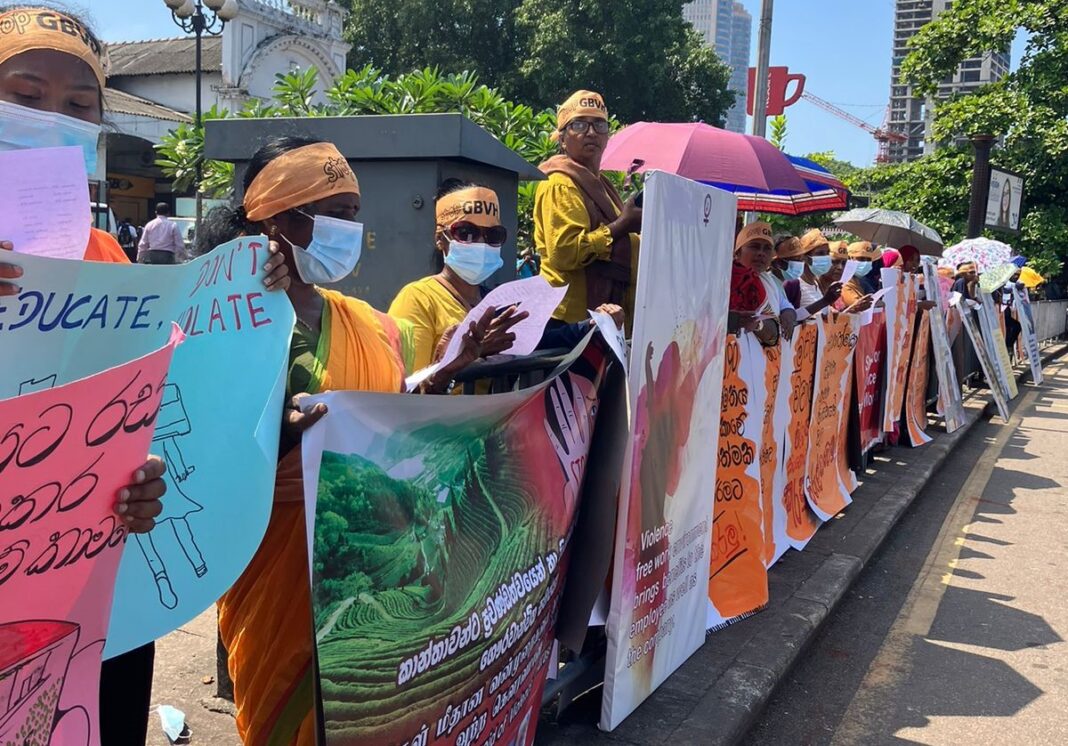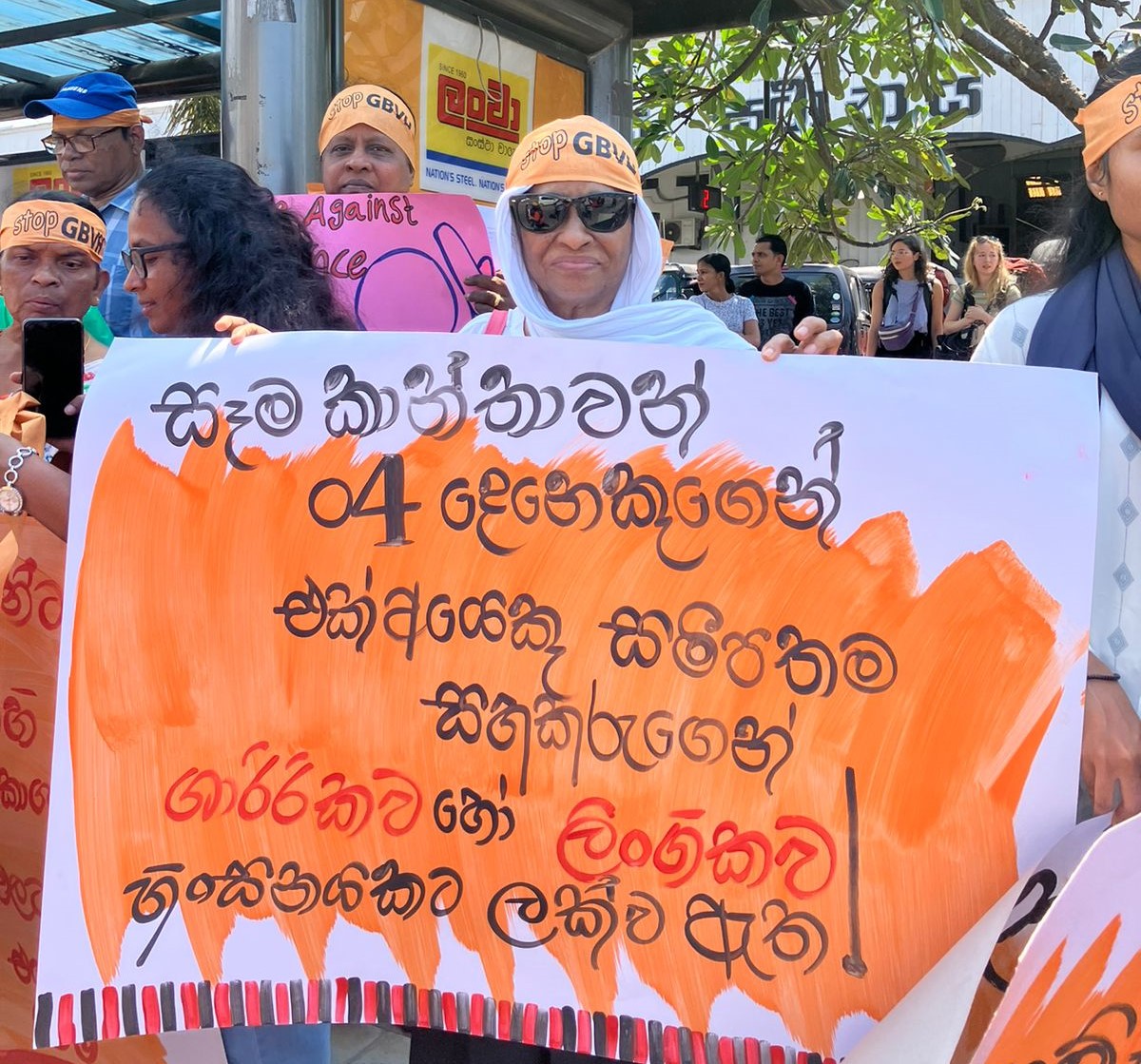Image: Sri Lanka women’s protest Nov 2023.
Former HRCSL Commissioner, AAL Ambika Satkunanathan on how SL continues to be a patriarchal society despite the development
25 November is the International Day for the Elimination of Violence Against Women. It is no secret that the Covid-19 pandemic and lockdowns led to an increase in domestic violence and intimate partner violence in the world. But, in Sri Lanka, even before the pandemic, one in five females had experienced sexual or physical violence by an intimate partner in their lifetime and one in four had experienced violence since the age of 15. According to United Nations (UN) Women, Sri Lanka is 92 on the Gender Inequality Index and 110 in the Global Gender Gap Index/Report. Clearly, females in our country do not have it any easier.
Following are excerpts from the interview with Human rights lawyer, activist and former Commissioner of the national Human Rights Commission of Sri Lanka (HRCSL), Ambika Satkunanathan, is an expert in transitional justice, accountability, and reconciliation.:
There’s a lot of rhetoric when it comes to eliminating violence against females, but, little action in Sri Lanka. Why is it so difficult to tackle this problem?
That’s a rather simple but also the most complicated question. I think that’s because this problem is about the position of females in our society. It’s about our values. We are a deeply patriarchal society and females live in a male-dominated society. Despite the fact that our Constitution states that everyone is equal before the law and should be treated equally and that nobody can be discriminated against on the basis of their sex, females are subjected to discrimination on those very same aspects. It is deeply ingrained in our systems, institutions, and values, so much, so that you don’t question the discrimination of a female in terms of the workplace or sexual harassment or family violence. The fact that a female going to the authorities to complain about her husband assaulting her is considered as something that should not be done is proof that we as a society have refused to tackle the root causes. Patriarchy, inequality, and discrimination are the root causes, so, even if we pass laws and set up new institutions to help females, these issues will still prevail.
Do you think that Sri Lanka has failed its females?
Not only has Sri Lanka failed its females, but, globally speaking, many countries have failed their females. Sri Lanka is one of them. Even looking at it regionally, we are far behind. For instance, where female’s political representation is concerned, we are one of the lowest as a country. We have definitely failed our females in terms of females holding positions of power within the State structure and in terms of the protection that is available to females against violence. When you look at all those aspects, it’s clear that we have failed.
What types of violence do females face the most today in Sri Lanka?
The problem that we have is the lack of clear statistics on this. One of the reasons is that not everything is reported. What is reported is the tip of the iceberg. From the cases that we see, we know that family violence is quite common. Usually, the wife or partner is subjected to physical violence by the husband. There’s also psychological violence. There’s sexual abuse of young children, of girls. We have incest. We have sexual harassment, which is very widespread. A female walking down a road or taking public transport is generally subjected to sexual harassment to a point where it’s expected and normalised. Females also have no redress. How is a female supposed to lodge a complaint with the Police against someone who harasses her on the street? Punishment doesn’t always solve the problem either, because these are deeply ingrained values that start from the home and are carried through to school, university, the workplace, and society. We must tackle it in home, at school, and perhaps in the school curriculum. These curricula are still quite stereotyped in terms of gender and we are yet to change that, and this is 2023. There is structural violence. The fact that discrimination, sexism, misogyny, and patriarchy are so ingrained within the systems of the country, that affects females. For example, when a female enters a Police station to lodge a complaint against an abusive husband, she is treated without respect because people think that family violence is something that should be kept private. This behaviour is ingrained in the structures of society, so that the normal way of functioning is to discriminate against females.
From your work in the national HRCSL, what has been shocking when you look at the justice system in Sri Lanka, especially when it comes to justice for females?
I’m at a point in my life where nothing shocks me. Everything is deeply disappointing, depressing, disheartening even, but, not surprising. The criminal justice system itself is deeply patriarchal. For a female, it’s not just about going to the Police and lodging a complaint. It’s also about the way a female is treated in court. It’s about what the defence asks a female and how they try to humiliate them. It’s about the response given by the judicial officer. At every stage, the female is not treated with respect or dignity, and has no protection against violence, discrimination, and abuse. The way females are treated in the criminal justice system is structurally ingrained discrimination. For example, if there is an accusation of rape, there is immediate suspicion as to whether there is any truth to it. They don’t believe the victim. Even if the case is filed, it takes 10 to 15 years for the verdict to be given. So, if a victim waits 10 years for a verdict, she no longer wants to be involved in the justice process, because it is looked upon as a stigma, as if it was the victim’s fault. Then come the questions. The system asks, “Why were you out at night?” and “Were you in a short skirt?” or “Did you have a little too much to drink?”. This is instead of asking the males, “Why are males sexually harassing females?” and “Why are we treating females unequally?”.
Has social media helped or not when it comes to eliminating violence against females?
It has both helped and hindered females. It has helped females by providing for them a safe space to express themselves, to anonymously talk about the violations that they’ve faced at the hands of society and males, to send messages to raise awareness, and to hold people accountable. For example, if a particular Police officer is treating a female without respect, they can take to social media and spread the word about the individual in question. With the massive numbers of shares across platforms, the mainstream news gets wind of it and finally it hits the eye of the Inspector General of Police, who may try to investigate this particular officer. On the other hand, social media has hindered females because we live in a patriarchal society and because the patriarchy has appropriated social media to perpetuate violence against females. A female public figure can be harassed online, a young female can be subjected to revenge porn, a female can be doxed (searching for and publishing private or identifying information about a particular individual on the internet, typically with malicious intent), and females’ bodies can be morphed with different faces and posted online by “fake” accounts that proceed to harass them. Many forms of violence are being perpetrated against females, particularly young females and females in the public eye, female politicians, female leaders and activists, and females who ask uncomfortable questions. It reverts to the fact that we are a deeply patriarchal society, which can weaponise something helpful, like social media, against females.
Where does Sri Lanka stand on violence against females, when compared to other countries?
We’re all in the same boat, more or less. Females in the region don’t have safe houses. Females who want to leave marriages but don’t have economic independence cannot leave. We can’t help them get back on their feet. There’s no psychological support for victims of violence in the region. In the region, all criminal justice systems are deeply patriarchal as well, so females struggle to find justice.
What should this country do to protect its females from violence?
There are multi-pronged processes that we can start off with. Firstly, we need to change mindsets with public campaigns and with people in power behaving differently. When male Parliamentarians use abusive language towards females in the Parliament, what hope do we have? The curriculum in schools must be changed, so that children are taught differently. Parents have to teach their children differently. Children learn from their parents. They look at the relationship between their mother and father and that relationship is impressed upon the child. We have to protect our females at multiple levels. It’s from the level of the law and the level of the institutions. It’s about raising awareness, changing mindsets, and changing the curriculum. It has to be a multi-pronged solution, because this is one of the most deep-seated problems that we have, not just in Sri Lanka but throughout the world. For example, the Prevention of Domestic Violence Act provides people with the ability to obtain a protection order against someone who has violated them. There is no necessity for a lawyer to do this. However, many people don’t know that this option exists and many others refuse to do it. There is also reluctance amongst judges to issue such orders, because, they justify that in the marital home, if a protection order is put against the male, he will not be able to come home. We have the law. When our Government goes to the UN Human Rights Council in Geneva, Switzerland or goes in front of the Committee on the Elimination of Discrimination against Women, it talks about these laws, but, these laws are not implemented because of the patriarchal mindset of those who make the decisions on implementing the law.
What do females have to do to kick-start the processes of change?
Females are already doing so much. Now, it is the duty of males to take the responsibility. This is because males are often the ones perpetrating the violence. They’re the ones in positions of power. They’re the ones in the Parliament and in the Police. Even though there are female Police officers, they also face discrimination and violence within their profession due to their gender. When I was at the HRCSL, we received complaints to that effect as well. When we talk about programmes to combat sexual and gender based violence, we do need to include males, and particularly young boys, in the conversation. Boys are like sponges. They take in patriarchal, sexist, and misogynist values practised in society and reproduce them. Then, we have no hope, because the younger generation follows in the footsteps of what’s going on now. It’s really the responsibility of males at this point, and males need to step up for females.
(The writer is the host, director, and co-producer of the weekly digital programme ‘Kaleidoscope with Savithri Rodrigo’ which can be viewed on YouTube, Facebook, Instagram, and LinkedIn. She has over three decades of experience in print, electronic, and social media)
26 Nov 2023 | BY Savithri Rodrigo/ The Morning
( Edited version)

